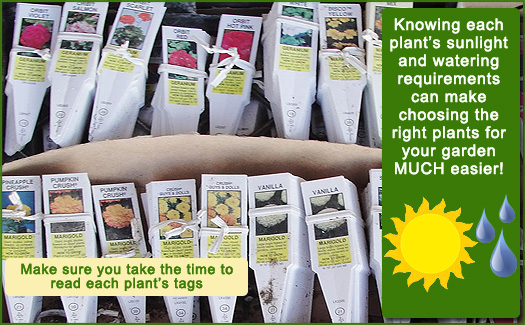How to Choose the Plants & Flowers to Grow in Your New England Garden
Last Updated:
Why You Need to Know the Sun and Soil Conditions
What is the Single Biggest Determining Factor in Choosing a Plant for Your New England Garden? That's an easy one - sunlight. Plants that require a lot of sun just simply won't grow in the shade, and shade-loving plants won't tolerate the hot summer sun. Make the wrong choice at planting time and no matter how much you fertilize, water and weed, you will be sorely disappointed with the results.
If the area you intend to plant gets less than a couple of hours of direct sun a day (preferably only early morning sun), then shade-loving plants like hostas, impatiens and daylilies are great choices. If, on the other hand, the area gets exposed to direct sun for many hours a day, its time to consider other plants. By the way, if its vegetables you are interested in planting, virtually all of them require a minimum of 6 hours a day of direct sun for good results. If you are trying to plant a vegetable garden in a shady area, you will not have much luck.

What About Soil Type, Soil Acidity, and Water? All three of these factors will certainly have an effect on the plant, and will usually determine the degree of success you have with growing the plant in the spot chosen. Classic New England rocky and sandy soils don't tend to hold moisture well, and also tend to be a little on the acidic side. Acid-loving plants like blueberries, azaleas and rhododendrons will do especially well in these soils, but it doesn't mean that other plants won't grow at all. It simply means that they will grow best under these conditions. And because chances are, your plant is not far from a hose or a watering can, consistent watering can remedy historically dry patches in your New England garden. So what's the point of it all? Just to be aware of the conditions in your garden before you plant something and try to match it as closely as you can for the best chance of success.
Native Plants to the Rescue... One of the easiest ways to ensure success in your garden is to look specifically for native North American species to plant in your garden. These plants have grown wild in New England and other areas of the country for millions of years with no attention at all, and have survived. Surely they can work in your New England garden with little to no effort. Some of our favorite types to plant are daylilies (sun or shade, wet or dry conditions), coneflower (sun, drought tolerant), black-eyed susans (sun, drought-tolerant) and native ferns (shade, wet conditions). Each will come back every year and require very little maintenance on your part. Check online for other plants and ask your local garden center about native varieties to plant.
Deer-Resistant Plants for Your New England Garden Deer seem to be eating everybody's gardens these days. They used to be infrequently seen in the suburban landscape, but with new developments encroaching on their natural habitats, they are becoming more adapted to life amongst houses and gardens. If you have particularly brave (or hungry) deer you may wake up one morning to find your entire garden stripped bare overnight. Yes, there's hope... just like people, deer have food preferences and planting deer-resistant plants around your home can mean the difference between having a garden and having to recreate Fort Knox around your house to keep them out. Some types that will grow easily in your New England garden include foxglove, bleeding heart, columbine, peony, poppy, beebalm, snapdragons, petunias and zinnias. Again, plan ahead before you plant and if you have deer, try to make sure you have at least a few varieties of deer-resistant plants in the garden.
Experiment Each Year with New Plants The only real way to tell whether a plant will thrive in your garden is to put it there and see what happens. Armed with the knowledge of sunlight and soil conditions, you should be able to make a good guess for compatibility and let mother nature do the rest. She will let you know if you picked the right plant for the right spot!